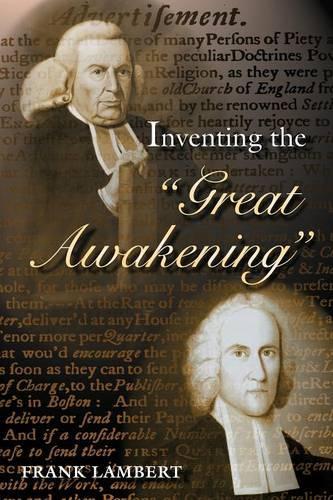
Inventing the "Great Awakening"
(Paperback)
Publishing Details
Inventing the "Great Awakening"
By (Author) Frank Lambert
Princeton University Press
Princeton University Press
2nd April 2001
United States
Classifications
Professional and Scholarly
Non Fiction
Christianity
Religious mission and Religious Conversion
History of the Americas
Social and cultural history
269.2097309033
Physical Properties
Paperback
320
Width 152mm, Height 235mm
482g
Description
This book is a history of an astounding transatlantic phenomenon, a popular evangelical revival known in America as the first Great Awakening (1735-1745). Beginning in the mid-1730s, supporters and opponents of the revival commented on the extraordinary nature of what one observer called the "great ado," with its extemporaneous outdoor preaching, newspaper publicity, and rallies of up to 20,000 participants. Frank Lambert, biographer of Great Awakening leader George Whitefield, offers an overview of this important episode and proposes a new explanation of its origins. The Great Awakening, however dramatic, was nevertheless unnamed until after its occurrence, and its leaders created no doctrine nor organizational structure that would result in a historical record. That lack of documentation has allowed recent scholars to suggest that the movement was "invented" by nineteenth-century historians. Some specialists even think that it was wholly constructed by succeeding generations, who retroactively linked sporadic happenings to fabricate an alleged historic development.Challenging these interpretations, Lambert nevertheless demonstrates that the Great Awakening was invented--not by historians but by eighteenth-century evangelicals who were skillful and enthusiastic religious promoters. Reporting a dramatic meeting in one location in order to encourage gatherings in other places, these men used commercial strategies and newly popular print media to build a revival--one that they also believed to be an "extraordinary work of God." They saw a special meaning in contemporary events, looking for a transatlantic pattern of revival and finding a motive for spiritual rebirth in what they viewed as a moral decline in colonial America and abroad. By examining the texts that these preachers skillfully put together, Lambert shows how they told and retold their revival account to themselves, their followers, and their opponents. His inquiries depict revivals as cultural productions and yield fresh understandings of how believers "spread the word" with whatever technical and social methods seem the most effective.
Reviews
"Lambert has written an important book for students of American religious and cultural history... [His] straightforward, non-sensational history makes a good case for 'great awakenings' in New England and several middle colonies before 1750 and marks a helpful turn in the debate about the real meaning of Joseph Tracy's Great Awakening."--Jon Butler, American Historical Review "Exceptionally well written and adequately documented... This is an important contribution to the debate."--Kenneth G. C. Newport, Theological Book Review "Lambert's work is synthetic in the best sense of the word, allowing us to see fully the contours of the revivals as they emerged in the public's eye... Lambert focuses squarely on this question and thus revivifies the language through which people described and explained what they thought was happening to them. His judiciousness in this matter should be a model to us all."--Philip F. Gura, Reviews of American History "Frank Lambert provides a surprising narrative of the awakening that is well written, thoroughly researched, and rich in implication... A brief review cannot do justice to this excellent work."--Michael J. McClymond, Journal of Religion "Replete with tables outlining revival events and publications, Lambert's book is a highly accessible account for specialists and nonspecialists alike. His attention to the importance of print, his appreciation of the role of transatlantic revival networks, and his sensitivity to the nuances of cultural 'invention' make this a model of historical scholarship."--Peter J. Thuesen, The Catholic Historical Review
Author Bio
Frank Lambert is Associate Professor of History at Purdue University and the author of "Pedlar in Divinity": George Whitefield and the Transatlantic Revivals. 1737-1770 (Princeton).
